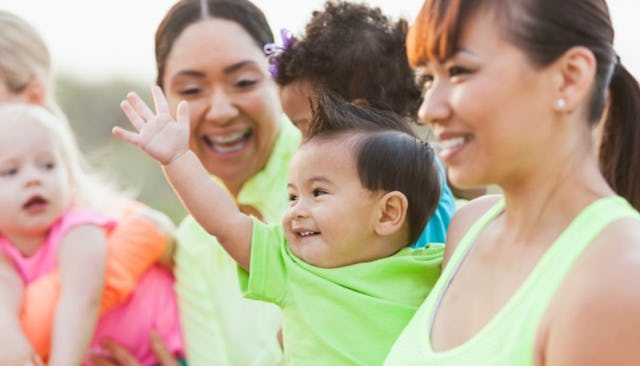How I Discovered The Village Is Larger Than I Thought

I’ve always believed that it takes a village to raise a child. I grew up in London surrounded by my extended family and immersed in our traditional Indian culture in which new parents are strongly supported by their relatives.
When I became a mother, my husband and I were living in New Zealand. We had very little family around us and were on the other side of the world from this close-knit network I’d always had around me. It was here, though, that I learned of a different village.
The mothers-to-be at prenatal classes—all unaware of how our lives were about to change—became my new family. They, and the new mothers at play groups and coffee mornings and local mothers’ meetings. Together, we cried about our lack of sleep, we shared good and bad experiences, we walked for hours trying to get unsettled babies to finally close their eyes, and we talked about it all.
Those women I’d only just come to know became my sounding boards, my advisors, my confidantes, my friends—my village. I listened. I didn’t always agree, but I was comforted at least by their care. We watched our babies turn 1 together, and in that year, we’d shared the best and the worst of times. We’d done it together, and as our babies had grown, so had we.
When I became a mother for a second time, I was back home. My husband and I, along with our son, had returned to London in time for the birth of our daughter. This time, the traditional village was my safety net. My mother held my baby when my husband and I were exhausted. My father entertained my toddler. My aunt made me nourishing traditional foods especially for breastfeeding women. My cousins shared their experiences of swaddling, weaning, and of course, getting the baby to sleep.
My first child is now 4. It has been some time since I have called on the village for its wisdom and comforting warmth, but I quietly, automatically, rely on the village every day for the very ordinary bits of life. My mother and father look after my children three days a week. My best friend, whose children are the same age as mine, always knows when to pour a glass of wine on a bad afternoon and is forever there to share stories about our darlings.
But reaching out is what I did this week, and I did it without really knowing I was doing it.
I worry less these days. I’ve accepted our weaknesses and our problems. I don’t worry that my daughter comes into our bed most nights, that she is still in diapers, that my son doesn’t care much for learning to write, that I don’t wash their hair enough, that they watch a lot of TV. Perhaps I’m finally confident that my decisions are made with only their best interests in mind, and because of this, I no longer worry about judgement.
Recently, though, something was weighing heavily on my mind. I opened up on my blog and on social media about my worries about my son. He has always been a very poor eater, but in the last few weeks my worries over his diet have grown. I reached out, online, and talked openly for the first time in a long time about my concerns. I described them in detail. I shared my fears. I opened up my soul and put my self-perceived failures out there for everyone to see. The worry had cemented itself so deep in my mind that it was as if I needed to write about it in order to really address it. And so, I shared it all.
I was finally brave enough to type the words “food avoidance disorder.” And there was the village. Even though I’d not realized I needed it, I was surrounded. I realized, then, that becoming a mother involves an endless path of learning: learning from mothers, from women who aren’t mothers but have wisdom to share, and from women who are kind enough to listen. Today, our village isn’t only made up of those we have loved forever. It’s also the people we are connected to online, the mothers we may never have met.
Old friends and new, family, acquaintances, readers, strangers—I was awed by those who had the kindness to contact me. Some shared stories, some commiserated with their similar experiences, some reassured me, and some just wanted to let me know that it would all, one day, be OK. I believe them.
Their thoughtful advice and wisdom, which I hadn’t really known I was asking for, helped more than I’d realized it could. My son’s diet hasn’t changed, but I remembered why I had come to trust my instincts: I know he will be OK.
The village can’t make my son eat, but as it offered its help and as I listened, the anxiety eased. I somehow found my strength in the village’s collective words and encouragement and remembered all the years it had taken to build this confidence in motherhood, which has been bolstered by the village but founded in my own refusal to justify my actions or be influenced by judgment.
The village is more than my family and my old friends and my new ones, too. It’s every reader, every parent and non-parent who has ever reached out or listened or just been there and let me know. And the power of the village isn’t just that it will raise a child—it will also be there to help, support and nourish a parent who couldn’t do it any other way.
It takes a village to raise a child. Yes, it does. But it also takes a village to raise a mother.